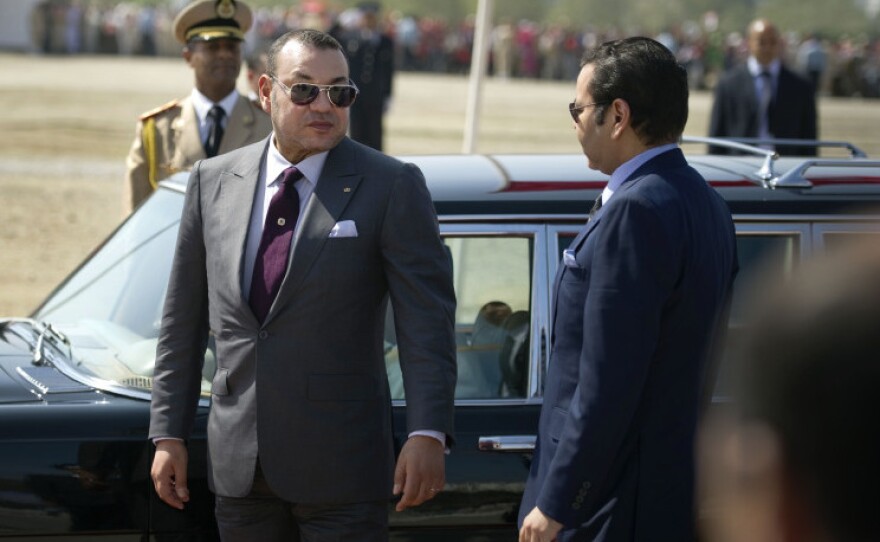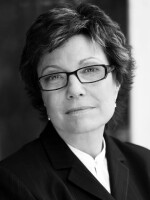If you're looking for the reasons for unrest in Morocco, you can find some answers while zipping along in a golf cart at a resort in the historic town of Marrakech.
The rentals at this exclusive enclave are all five-star: large villas with extra rooms for a full-time butler and a chauffeur. There's a lake, a spa and an 18-hole golf course for the clientele — who are, it goes without saying, very rich.
"In Morocco," says Mustapha, a resort employee, as he takes a prospective client on a tour, "you have the money, you live good."

This place is called the Secret Garden. But it's no secret that the gap between rich and poor in Morocco is one of the widest in the Arab world. About 15 percent of the population lives on $2 a day. The literacy rate is little more than 50 percent and, political analysts in Morocco say, there's a lack of opportunity and lack of hope among the young.
Just a short drive from the golf course is another Morocco, one with no electricity or running water.
This neighborhood sits in the middle of an olive grove. The roads are unpaved, and the houses are made of concrete block and mud. A woman uses a branch to sweep outside her home. This is the poor Morocco.
Poverty is one of many issues that ignited protests in the region — and in Morocco. On Feb. 20, 2011, Moroccans took to the streets to demonstrate in a country considered one of the most stable in the region. King Mohammed VI moved quickly to placate the protesters by offering constitutional reforms and calling early elections.
But progress toward democracy has also revealed the limits of civil disobedience.
Desire For A Different Kind Of Monarchy
The spark came when a group of young Moroccans called for demonstrations on Feb. 20 with a YouTube video that stated their demands for freedom and equality — their motives for calling for the street march. For the first time, demonstrators were directly challenging the absolute powers of the king, says businessman Karim Tazi, who joined the protest.
"In a lot of Arab countries, the goal was a simple one — get rid of the dictator," Tazi says. "In Morocco, the situation was more complicated than that. No one wanted to get rid of the king, but they want a different monarchy, they don't want an authoritarian one."
Economist Fouad Abdelmoumni says they want a symbolic monarchy more like Britain or Spain and a parliament with powers. They want a democracy, he says, not through revolution, as in Libya, Egypt and Tunisia, but through reform.
"We have a whole generation that is emerging to politics, that is beginning to think of politics and beginning to have faith that they can lead their life and change their situation," Abdelmoumni says.
A year after the first demonstrations, reforms offered by the king are being tested. The head of the new government is an Islamist. His Justice and Development Party, or PJD, won the most votes in November elections, but the king and his advisers still retain substantial power, says Abdelmoumni, and can stall the proposals of the PJD.
"Will they be able to change the mindset where corruption and nepotism [are] the basic behavior of the state?" he asks.
That is the election promise, says Abdelmoumni, and party officials have already pledged to disclose the list of Moroccans who have benefited from a system known as grima, a French word that in Morocco means favors bestowed by the monarch.
"They will pay the price if they decide to go strongly against corruption, and they will pay the price if they don't go far enough, because the population is expecting a lot," Abdelmoumni says.

A Limit To The Changes
This population expects jobs. Unemployed college graduates protest every week in the capital. They shocked the country a few weeks ago when five set themselves on fire. Three were hospitalized and one died.
The new government's strategy is to seek economic growth and curb corruption, but Ahmed Benchemsi says that could lead to a collision with entrenched interests — the elites connected to the king.
Benchemsi, the former publisher of a popular news magazine, is now a visiting scholar at Stanford University's Center on Democracy, Development and the Rule of Law. In a visit home to Rabat recently, he explained that the monarch controls much of the Moroccan economy.
"[The king] is the No. 1 businessman in the country," Benchemsi said. "He's the No. 1 grocer, he's the No. 1 farmer, he's the No. 1 landowner, he's the No. 1 steel producer, sugar producer. ... He's a huge businessman."
And despite the new constitution, the king can still block any law he dislikes, Benchemsi says, adding that there are limits to the changes won by the protest movement a year ago.
It's a critique heard across the region from the young protesters who brought so many to the streets.
"They should have worked like a political movement," says Benchemsi. "But the thing is, the protest movement in Morocco is not a political movement. It is just a bunch of kids who dream of democracy — which is a beautiful thing, but it's not enough to shake a deeply rooted system like the Moroccan monarchy."
The demand in Morocco was to shake up the system, not destroy it. But if the government and the king fail to deliver soon, analysts say, the next confrontation could be tougher — against the monarchy itself.
Copyright 2022 NPR. To see more, visit https://www.npr.org. 9(MDAzMjM2NDYzMDEyMzc1Njk5NjAxNzY3OQ001))







